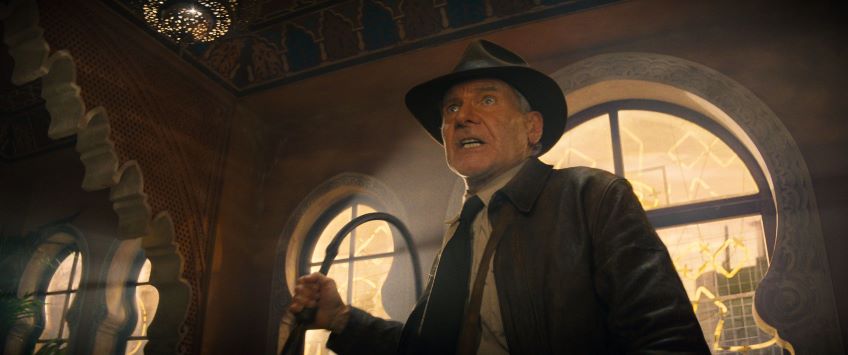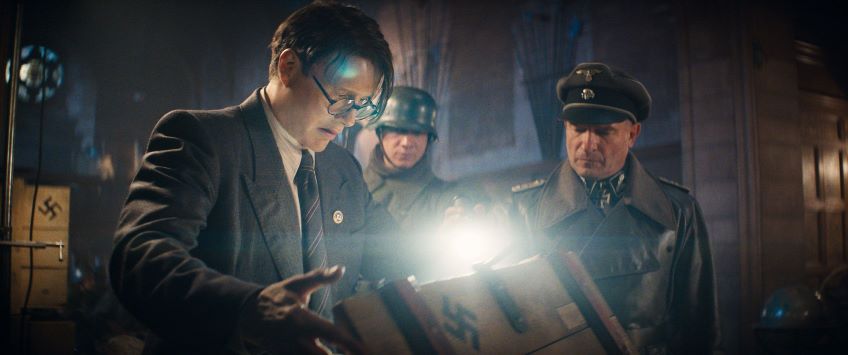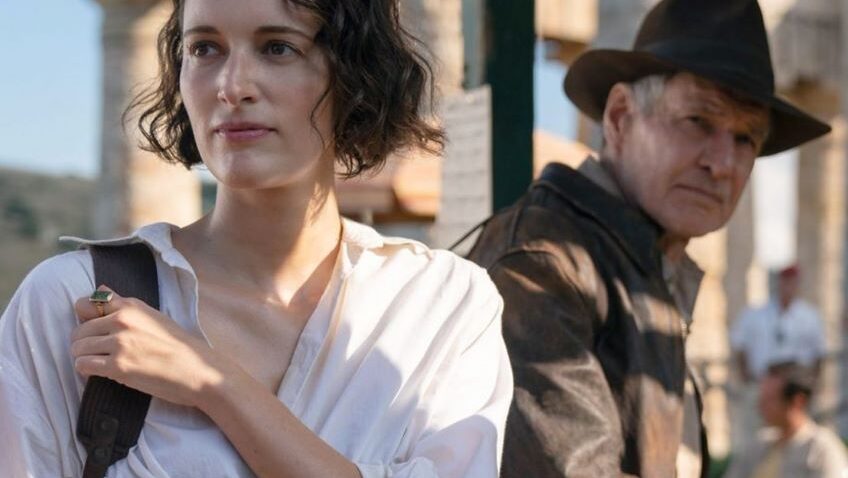Joyce Glasser reviews Indiana Jones and the Dial of Destiny (June 28, 2023) Cert 12A, 154 mins.
This is the fifth and final feature film in the Indiana Jones franchise, at least the last with Harrison Ford, 80, and it is impossible to imagine the franchise without him. Ford is still charismatic enough to carry a movie and does that here. The film boasts a fittingly stellar cast including Phoebe Waller-Bridge, Mads Mikkelsen, Toby Jones, Antonio Banderas and a cameo from Karen Allen (72), and an inspired plot that takes too long to reach its audacious and melancholy climax.
Ford was already 39 (and already known as Hans Solo in Star Wars) when he created arguably the most appealing adventurer in movie history with Raiders of the Lost Ark. Steven Spielberg was 35, when he changed the way action films were shot forever and was rewarded with five Academy Awards.
Dial of Destiny is the only film in the franchise not directed by Spielberg and in which George Lucas does not have a script or story credit (although he and Spielberg are executive producers). That’s the bad news. The good news is that it is directed by James Mangold, who directed one of the greatest superhero Sci-Fi films ever made, the X-Men Wolverine spin-off, Logan.
Why that is important is because like Logan, The Dial of Destiny is about this iconic action hero growing old. Logan was about two ageing and battle weary mutants who come out of retirement to rescue a young female mutant, keeping their race alive while facing their own mortality.

In The Last Crusade, both Spielberg and Ford, then 47, wanted Ford to do his own stunts but keep his greying hair. When Indiana Jones and the Kingdom of the Crystal Skull was released in 2008, Ford was 64. He reportedly told David Koepp, who wrote the story, to add references to his age, and Spielberg was careful to show the older man breathing more heavily after a jump, remembering the line in Raiders of the Lost Ark: “it’s not the years, it’s the mileage.” In contrast to the ageist National Default Retirement Age in this country at the time, sexagenarian Jones is promoted to Associate Dean at Marshall College for his archaeological feats.
Early on in The Dial of Destiny we realise with a jolt, if not a shock, that this is the Logan of the Indiana Jones franchise. The film’s extended prologue takes us back to the Pulp Fiction 1950s B-movie action style of Raiders with a CGI rejuvenated Jones running across the top of a train containing Nazis and a couple of MacGuffins. This time, a lance that turns out to be a fake and half of a dial of destiny, invented in the 3rd century BC by the Greek mathematician Archimedes of Syracuse. Because the invention has the potential to alter the time-space continuum, Archimedes who invented weapons against the Roman invaders, knew enough to hide the other half.
The train also contains an evil German, Jürgen Voller (Mads Mikkelsen) and – of all people – British archaeologist Basil Shaw (Toby Jones), a brilliant scientist who first figured out Archimedes’ hidden invention. Though Shaw is new to the franchise, he and Jones were close friends and colleagues. The two scientists nearly get killed, but it’s Voller and the half-dial that disappear – at least for 25 years.
Fast forward to a summer day in 1969. Jones, shirtless, slouched in front of the TV in his modest flat is annoyed by a flat-full of hippies below blasting The Magical Mystery Tour (a bit psychedelic, like the film) so loudly that Jones protests. Jones is here the stereotypical grumpy old man for another reason, too. On the table in his flat is a “separation agreement” from Marion Ravenstone (Karen Allen) whom he finally married at the end of Kingdom of the Crystal Skull. We learn in this film that the pain and guilt over the son they lost, was responsible for the split.

The CGI that gives us a middlingly fair replica of a 40-year-old Harrison Ford in the prologue is now gone and we face the ravages of time. We see a flesh and blood 80-year-old man, albeit one whose good bone structure is somehow enhanced and one who has continued to go to the gym in preparation for these gruelling roles.
Jones is still teaching, way past retirement age, however, his young students are bored and only one seems to have done their reading. That one is a chipper newcomer who is too old to be a student, but who knows all the answers. Her presence in the classroom is calculated, as is everything that quick-thinking mastermind Helena Shaw (Phoebe Waller-Bridge) does. Jones does not recognise Helena although she is his goddaughter – but she remembers him. Jones is as surprised as we are to learn that this tall, lanky woman is the late Basil’s daughter.
Helena might not be a chip off the old block, but she seems to be an accomplished scientist with a prodigious capacity for memorising formulae and a keen interest in ancient treasures. She does not, however, share Jones’ morals and principles. Whereas Jones believes that the dial of destiny belongs in a museum, Helena is a grifter who has plans to sell it to the highest bidder.
But not before Indiana Jones dusts off his trademark hat, grabs his bullwhip and starts his globe trotting pursuit of the deceitful young woman and her street urchin sidekick Teddy Kumar (Ethann Isidore). Eventually the two must form an uneasy alliance to beat Voller. The goddaughter tag is a clever way to cast a younger female in the typically romantic sidekick role without accusations of misogyny.
While Waller-Bridge contributes feminist values, energy, swagger and witty banter (a nod to the Ben Hecht comedies), her character is a shallow catalyst for the chase game played out and does not make sense. Her transformation from Shaw’s suddenly emergent daughter to a deceitful grifter, to a combination of Florence Nightingale and Mary Poppins (wait until you see how she creates one big happy family in the last ten minutes) is not supported by a convincing character arc.
The wonderful (and usually witty) Mads Mikkelsen is wasted as Voller, a one dimensional role. He is in hot pursuit of Jones and Helena, eager to use the dial to return to 1939 and change the course of the war. (And bring the franchise full circle).
When Voller reappears in 1969, unlike Jones, he has not aged a bit from WWII. What’s he doing protected by a US Government Agent and a bunch of thugs? Based loosely on the historic fact that the USA invited German scientists to America to develop nuclear weapons after 1945, here, Voller is hired by NASA to help with the moon landing, which he hopes to use to his advantage. Dr Strangelove (1966) was genius. Mikkelsen’s rogue scientist is just another conventional baddie.




